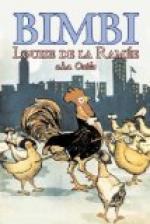The day grew apace, and noon went by, and with it the rain passed. The sun shone out once more, and Lampblack, even imprisoned and wretched as he was, could not but see how beautiful the wet leaves looked, and the gossamers all hung with raindrops, and the blue sky that shone through the boughs; for he had not lived with a great artist all his days to be blind, even in pain, to the loveliness of nature. The sun came out, and with it some little brown birds tripped out too—very simple and plain in their costumes and ways, but which Lampblack knew were the loves of the poets, for he had heard the master call them so many times in summer nights. The little brown birds came tripping and pecking about on the grass underneath his tree-trunk, and then flew on the top of the wall, which was covered with Banksia and many other creepers. The brown birds sang a little song, for though they sing most in the moonlight, they do sing by day too, and sometimes all day long. And what they sung was this:—
“Oh, how happy we are, how happy! No nets dare now be spread for us, no cruel boys dare climb, and no cruel shooters fire. We are safe, quite safe, and the sweet summer has begun!”
Lampblack listened, and even in his misery was touched and soothed by the tender liquid sounds that these little throats poured out among the light yellow bloom of the Banksia flowers. And when one of the brown birds came and sat on a branch by him, swaying itself and drinking the raindrops off a leaf, he ventured to ask, as well as he could for the iron that strangled him, why they were so safe, and what made them so happy.
The bird looked at him in surprise.
“Do you not know?” he said. “It is you!”
“I!” echoed Lampblack, and could say no more, for he feared that the bird was mocking him, a poor, silly, rusty black paint, only spread out to rot in fair weather and foul. What good could he do to any creature?
“You,” repeated the nightingale. “Did you not see that man under the wall? He had a gun; we should have been dead but for you. We will come and sing to you all night long, since you like it; and when we go to bed at dawn, I will tell my cousins, the thrushes and merles, to take our places, so that you shall hear somebody singing near you all the day long.”
Lampblack was silent.
His heart was too full to speak.
Was it possible that he was of use, after all?
“Can it be true?” he said timidly.
“Quite true,” said the nightingale.
“Then the master knew best,” thought Lampblack.
Never would he adorn a palace or be adored upon an altar. His high hopes were all dead, like last year’s leaves. The colors in the studio had all the glories of the world, but he was of use in it, after all: he could save these little lives. He was poor and despised, bruised by stones and drenched by storms; yet was he content, nailed there upon his tree, for he had not been made quite in vain.




